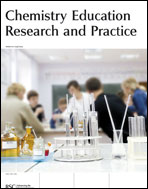The use of microcomputer based laboratories in chemistry secondary education: Present state of the art and ideas for research-based practice
Abstract
In microcomputer based laboratories (MBL) and data loggers, one or more sensors are connected to an interphase and this to a computer. This equipment allows visualization in real time of the variables of an experiment and provides the possibility of measuring magnitudes which are difficult to measure with traditional equipment. Research shows that the advantages of using this technology go further than simply motivating students as they can improve other abilities, such as interpretation of graphs, and it can help to develop several competencies and higher order learning skills in students. The aims of this study are to learn about the potential of MBL in chemistry classrooms and to present a framework for research based lab sheets. In this work, research reporting significant learning in secondary school chemistry laboratory using an inquiry approach related to microcomputer based laboratory experiences is reviewed. Instructional effectiveness of the technology, research based materials for students, ideas for practice and opinions of teachers and students when using this technology are reviewed.

 Please wait while we load your content...
Please wait while we load your content...